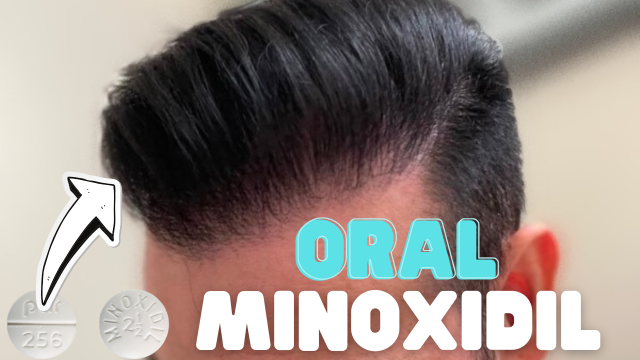Minoxidil is a common medication used to treat hair loss. It can be purchased in topical and oral forms, but many people are unsure of the safety of oral minoxidil. Here, we’ll look at what you need to know about this treatment option and whether or not it's safe to use to treat genetic hair loss.
How Does Oral Minoxidil Work?
Oral minoxidil is taken as a tablet once or twice a day and works by increasing blood flow to your scalp, which helps stimulate new hair growth. In addition, it increases the size of existing follicles, which helps the hair grow longer and thicker. Oral minoxidil can also prolong the hair follicle's life cycle's anagen (growth) phase. Thus, keeping more active hairs on the scalp and delaying the miniaturization process. Oral minoxidil has been proven more effective than topical minoxidil for treating male pattern baldness and other forms of hair loss.
Studies on Oral Minoxidil
Several studies have been conducted on oral minoxidil, with generally positive results. A 2019 study published in the journal Dermatology Research and Practice found that oral minoxidil effectively treated male-pattern baldness in men aged 18-45. The study showed that after eight weeks of treatment with oral minoxidil, subjects experienced an increase in hair thickness and density compared to the control group who did not receive the medication. Another study published in the same journal found that oral minoxidil effectively treated female-pattern baldness in women aged 18-45. In this study, subjects experienced an increase in hair density after eight weeks of treatment with oral minoxidil compared to baseline measurements taken before treatment began.
Another retrospective study on low-dose oral minoxidil (LDOM) patients, an observation of 1,404 patients (943 women and 461 men) noted that the most common adverse reaction was hypertrichosis (excessive hair growth), which occurred in 15%. The second most common adverse reaction was lightheadedness, which occurred at 1.7%. The third most common adverse reaction was fluid retention (edema), which occurred in 1.3%. The serious or troubling adverse reactions like tachycardia (heart palpitations) occurred in 0.9% or less than 1%. No life threatening adverse effects were observed.
Is Oral Minoxidil Safe?
The short answer is yes—oral minoxidil is generally considered safe when used as directed by your doctor. However, there are some potential side effects that you should be aware of before deciding if this option is right for you. These include increased heart rate, dizziness, nausea, vomiting, headache, rash, low blood pressure, and dry mouth. Contact your doctor immediately if you experience any of these side effects while taking oral minoxidil.
In addition to potential side effects from taking oral minoxidil, there may also be interactions with other medications that could be dangerous if they're not monitored properly by your doctor. Before starting any new medication—including oral minoxidil—you must talk with your doctor about any other medications or supplements you may be taking so they can adjust your dosages accordingly.
Conclusion
Oral minoxidil is generally considered safe when taken as directed by a hair loss doctor. Still, there are potential side effects and interactions with other medications that must be monitored carefully by a medical professional for it to be an effective treatment option for hair loss. Before starting any new treatment regimen for hair loss—including oral minoxidil—it's important to speak with your doctor about any potential risks to ensure the best outcome for your individual situation. With proper monitoring and guidance from a medical professional, oral minoxidil can be an effective way to help treat hair loss safely and effectively for many patients.

